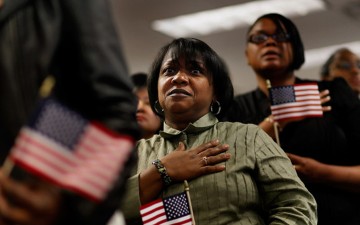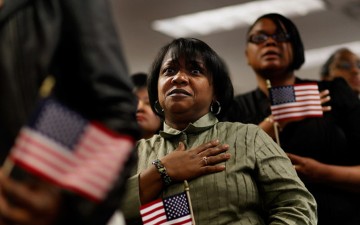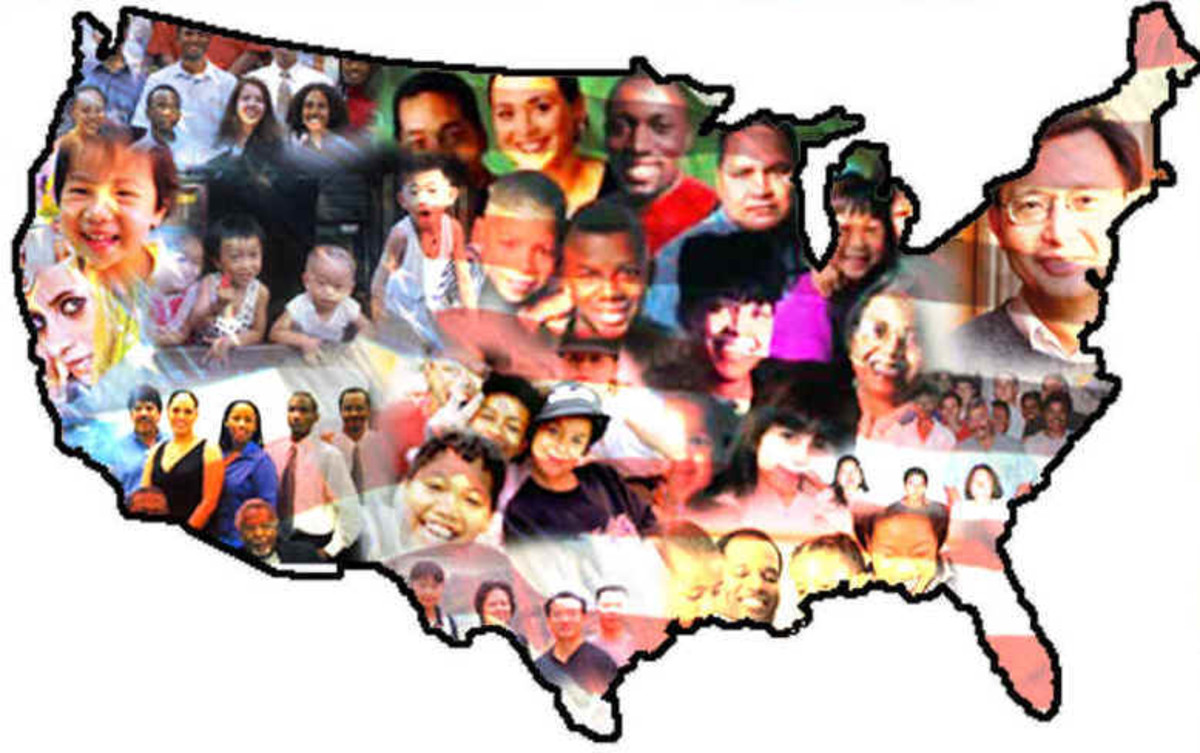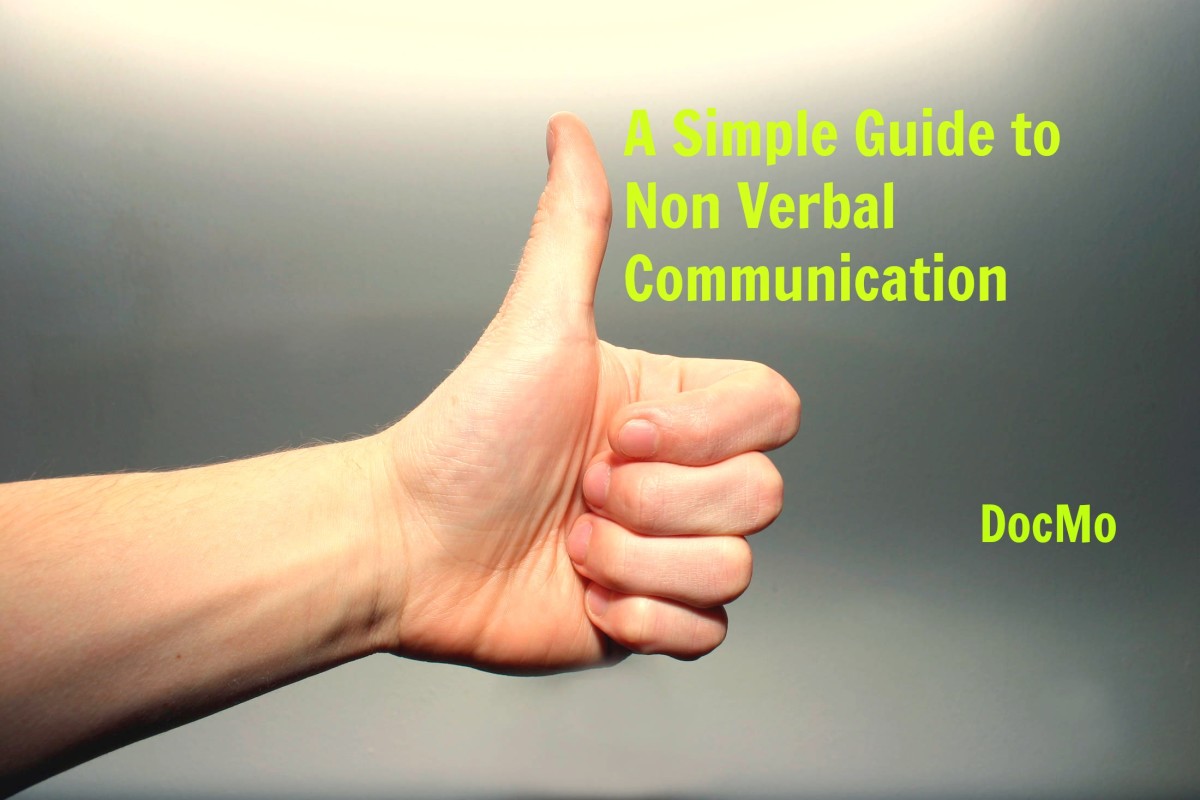Travelling to the Land of Dreams


My mother, Janet Erike, emigrated from Cross River State (Boki), Nigeria over to the grand, populous city of New York. As a college and beauty school student, Janet lived through the emigration and adjustment process. Her experience, as a college student adjusting from Nigerian culture to American society, (along with other Nigerian students’ stories) has helped mold my Nigerian American student identity. By analyzing Janet’s and other Nigerian students’ adjustment process to American society as Nigerian college students and focusing on why Nigerian college students moved to America in the 1980s, my own culture and identity background will be seen more clearly.
Janet grew up in a village in Cross River State, Nigeria, which is also known as Boki. The Nigerian language (dialect) she speaks is actually called Boki. The atmosphere and background my mother grew up in is completely different than any kid brought up in the American society. The village’s community that Janet grew up with was extremely interconnected. Everyone knew everyone’s business, so there weren’t too many secrets. Kids would run around the village playing with one another, in a poor, yet happy environment. My mom grew up walking everywhere, walking to fetch water, walking to school, simply walking to all places close and far. Despite the happy nature of her childhood, my mother and most people she knew or encountered yearned for more. The village people realized that they were poor and there were extremely few people in the Cross River State area that were rich (corrupt government officials, lawyers, etc.). “Nigeria is a country rich in natural resources including its people. But, we have not found a way to turn the resources into opportunities for everyone” (Obiakor 57). Nigeria had all the resources and people to be a great nation, but unfortunately corrupt political leaders can hinder progress. Therefore, Nigerian people such as the people of my mom’s Boki village heard stories and tales of the great riches that waited in America for those daring to travel the great distance to an otherwise unknown and foreign. When my mom was in high school, she would attend movies that depicted all the joy, happiness, and fortune that the United States had to offer. Janet and her friends would then talk about how great it would be to move their and start a new life. However, my mom was one of the few people that didn’t just talk about it, in 1982 after graduating from high school, she moved to New York City. Statistically speaking, out of the total 1.5 million African immigrants in the United States, 14 percent come from Nigeria (roughly 209,000 Nigerian immigrants). This shows that the most African immigrants that come from Nigeria, and my mom was and is one of the 14 percent. Out of this 14 percent, there are Nigerian immigrants from various backgrounds that travelled to the United States for different reasons. My mom fits into the women population out of that 14 percent and women emigrated to America for reasons like marriage, being a student, political warfare/violence in their home region, corruption, and etc. My mom came over to America on a student visa to attend college. Through books and stories Nigerian female students was researched and surprisingly there was a wealth of information available. By analyzing my mom’s emigration story and adjustment process and the other stories and tales told, the culture of the Nigerian American college student emerges.
Janet left Cross River State in 1982 with a Nigerian student visa which allowed her to travel and live in the United States as long as she took college courses. Many Nigerians obtain student visas to gain an American education and they either stay in America or come back to Nigeria and take advantage of their American college education by getting a high-paying job or political power. “Coming from Nigeria to the U.S. to further my education was a dream. My father, a businessman, wanted to make sure he trained his children in higher education. He acknowledged his lack of education prevented him from maximizing his fullest potential” (Obiakor 5). This is just one example of countless Nigerian children that were taught growing up that education is the key to success and power, and the best form of education was thought to be taught in the United States, which is why my mom, Janet, emigrated to New York in order to potentially have a better education and life. My mom flew into John F. Kennedy International Airport in New York City. Through my analysis, I believe that any Nigerian knowing any person in America beforehand was one of the keys to a successful adaptation. Janet was lucky enough to already have an older sister, Maria, studying in New York at Hofstra University. Also, the family she stayed with, in Long Island, New York, was actually from her village of Boki and had moved to America years before. It was a common scenario for Nigerian students to link up with Nigerian connections over in America, for an easier adaptation experience to American society. In the village of Boki, it was a common village ideal to reach out and help your neighbors as if they were family. This ideal carried over to the United States and Nigerians would reach out to new Nigerian immigrant college students to give shelter, food, or simply advice. These Nigerian students would also meet up with other Nigerians and have events or just parties, where Nigerian food would be prevalent and the topics at hand might involve Nigerian home life and how everyone was acclimating to American society and their college peers. “…I wondered why I hardly saw African Americans, especially males, on campus. I realized that most Black men on campus, were from some African countries, especially, Nigeria. Even around the city, there were at least 200 Nigerian families with their children” (Obiakor 83). It was a common occurrence for a Nigeria to see other Africans going around college campuses, especially other Nigerians.
The number one key for Nigerians to adapt to America was having an open mind, which the younger college student Nigerian generation had more so than the older generation, who had wives, kids and were searching for a job. Before talking about the openness of college students minds, the migration pattern of Nigerians to America must be noted. The main reasons Nigerians were leaving the country in the first place during the 1970s and 1980s, was because government and living conditions were becoming increasingly worse. America wasn’t just the hope for a better life; it seemed like the best decision when immigrating from the poor villages, even in Cross River State. Especially since the corrupt government, government officials, and military leaders were more concerned about their own financial and political gain. Political life did not fully open up again until shortly before the ill-fated Second Republic began in 1979, when political party formation was again permitted. Following the return to military rule in 1983, and then the erosion of the Babangida regime’s early promise, Nigerians steadily found themselves becoming poorer and less safe. At the same time many educated Nigerians were leaving the country in search of greener pastures, with many ending up in North America. Conditions in Nigeria became steadily worse as time progressed. (Konadu-Agyemang 153-154)
Nigerian students like my mom left Nigeria to places such as the United States knowing that they were stepping up to a better life, where the government wasn’t corrupt (or at least not as corrupt) and there was opportunity for financial success and safety.
Through the analysis of Nigerian student emigration (in the 1970s and 1980s), it was mentioned that the key for Nigerians to adapt to the United States was having an open mind. To truly understand and acclimate to the new American culture, Nigerians needed to keep an open mind otherwise they would just end up moving back to Nigeria. My mom Janet emigrated to New York City when she was 19 years old; therefore she was a part of the younger generation of Nigerians that emigrated. Her adaptation wouldn’t necessarily be defined as an easy transition to American life because she came from a vastly different Nigerian culture; however, the process was easier because she was young enough to have a more open and clear mind about adapting. The older Nigerian generation that emigrated during the 1980s didn’t fare as well as students like Janet. Their minds, ideals, and values were so set up and in tune with their old Nigerian way of life that it was tough to absorb the new American culture they were entering. It was especially harder if the Nigerian had left children, a husband, or a wife back in Nigeria, it would make it almost impossible to become accommodated to the new American environment. “Despite rooming with two other girls, Lydia said she was lonely. She missed her boyfriend and grandmother terribly…In her city in America she knew nobody and did not know that there were actually other Nigerians in colleges all over the city…After her graduation…she returned to Nigeria (Ette 93). This is a story of a forty-five-year-old Nigerian woman named Lydia who had a terrible time adjusting to the United States, mostly because of age. Although she attended an American college, the transitioning was too difficult for her. If she was younger, perhaps in her twenties, then she would have had time to accommodate herself with her new life. Most of the more positive stories of Nigerian female college students actually enjoying their immigration to America are told by the younger generation of female students, who are in the stage of life were they can still absorb a new culture, mold it, and accept it as their own. This directly correlates to my mom’s own experience of getting used to American society. My ultimate source of a Nigerian woman college student adjusting to American society would be of course my own mother Janet. When she flew in to New York City in 1983, she was met with an initial negative outlook of America because of winter. It was winter season, so the weather was terribly cold, which was a shock to Janet, who grew up in warmer, tropical climate in Nigeria. As she was driven to Long Island, by Nigerian friends, she was also disappointed by the pot-holes in the road. This poor infrastructure in the roads was a common occurrence in Nigerian, so Janet thought that in America, which was supposedly truly great, there wouldn’t be problems like pot-holes. Besides those initial disappointments, America lived up to and exceeded her expectations. My mom was foremost amazed at the size of the food that could be purchased, like a bucket of chicken from Kentucky Fried Chicken for a couple of bucks. This wasn’t something Janet was used to because growing up in Nigeria; there weren’t buckets of chicken available for purchase at markets, restaurants or any place. The quantity and low price of fast food surprised my mom and enraptured her. In Nigeria, because the lack of food and nutrition, many villagers that Janet saw growing up were skinny, few were thicker, overweight, or fat. For the few that were actually overweight, Janet used to be jealous of them. That’s right, my mom used to be envious of people losing weight because she herself was skinny. She was so used to seeing the skinny villagers of Boki, including herself, that she wanted a change of body, a heavier body. This was an amusing concept to analyze and find out.
Nigerian college students that immigrated to the United States chose where they would immigrate to an American college based on a couple of key factors. Some factors for prospective Nigerian students would be school size, region of the U.S., quality of department of study, and location. The most influential factor for any person trying to adapt to a new environment, any person including a Nigerian immigrant student, would be the weather. Any individual trying to adjust to a new environment has to have a positive experience with the weather; otherwise it becomes a meaningfully negative first experience to the new area of living. Anyone, especially an immigrant new to this country, can’t view the weather as an adversary, or negative force, otherwise it would push the person back to where they came from. Basically, the weather could start a downward spiral of a horrible experience in living in a foreign area, particularly a foreign country. This is why the migration areas of college students from Nigeria to the United States is concentrated in areas with either popular, highly rated schools, areas that have great weather, or areas with big cities. Therefore, it comes as no great surprise that the top two regions where Nigerians immigrate to are the South Atlantic Division (in the South) and the Middle Atlantic Division (in the Northeast). The South Atlantic Division accounts for 28.4% of Nigerian immigrants, while the Middle Atlantic division accounts for 25.4%. The Middle Atlantic being the leading region for Nigerian immigrants, including students, comes as no surprise since that area includes busy, exciting New York, and even New Jersey; while the South Atlantic region has alluring weather and great states such as Florida and Georgia. My mom’s dream vision of America wasn’t in any of those two regions, Middle Atlantic or South Atlantic. Her dream vision of America lay in the sunny, beach state of California. California is located in the Pacific Division in the West, where it accounts for 10 percent of Nigerian immigrants (fifth-most place Nigerians immigrate to). Janet initially came to Los Angeles, California to visit her older brother, Matthew, who was a lawyer. She fell in love with the weather, the beach, and even the roads were nice (better infrastructure than pot-hole filled New York). To her, this was the beautiful vision of America that had been depicted to her while she was growing up in the Boki village in Nigeria. She convinced herself that she would move back here once finishing beauty school and college in New York, and eventually she did.
Nigerian immigrants faced many struggles (besides the earlier one I mentioned) in moving and adapting to their brave, new world. The biggest challenge, besides culture transition, was the racial divide they faced. There was (and still is) racial segregation and stereotyping towards Nigerian college students.
My next trip was to take a taxi to New Jersey’s Newark Airport. I was invited by a taxi driver who told me that he already had three passengers going to New Jersey. I believed him and joined the passengers. The driver and passengers (four of them) were Whites, and I stopped and the three passengers came out with guns in their hands. I was robbed at gunpoint—these marauders had taken all my money (Obiakor 6). This incident might not have necessarily been targeted at him because he was black, but the marauders were clearly targeting a foreigner that wasn’t too sure of himself (because he was new to the country). A negative experience such as this would give any person second thoughts about living there. Luckily this Nigerian student was able to get over regain his confidence towards America and live on his life, despite a bad first start. There are many other examples of Nigerians that encountered struggles.
Condescendingly, he began to lecture me. “Sir, he continued, you want tea that is hot. That is the same thing.” Then, he left and came back with microwaved iced tea! Because I was Black and “talked funny,” he had concluded that I did not know what I was talking about… In an innocuous social conversation—which is about the only one feasible in some cases—would politely nod approvingly at whatever I say or do not say. If I dared ask, “Do you understand what I was saying?” “Not really!” would be the honest answer, with a guilty grin on the face. (Obiakor 19-20)
Since Nigerians have their own accent and dialects, sometimes it would be hard to understand them. Despite the fact, Nigerian students came to understand the cultural differences in language and would learn to speak clearer and slower.
There were many facets to understanding what it was to be a Nigerian college student. Overcoming struggles and adapting to a new culture was the key features to successfully acclimating to the new American environment. My mom, Janet Erike, managed to emigrate here successfully and so did hundreds of thousands of Nigerian college immigrants. My cultural background is that of an adapting, ever-changing, and persistent beating Nigerian American heart.







